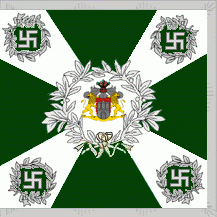![[Police Command 1937-1945 (Germany)]](../images/d/de_cpol.gif) 1:1 Image by Jaume Ollé, 15 Sep 1998
1:1 Image by Jaume Ollé, 15 Sep 1998
FOTW beschäftigt sich mit der Wissenschaft der Vexillologie (Flaggenkunde).
Alle auf dieser Website dargebotenen Abbildungen dienen ausschließlich der Informationsvermittlung im Sinne der Flaggenkunde.
Wir distanziert uns ausdrücklich von allen hierauf dargestellten Symbolen verfassungsfeindlicher Organisationen.
Last modified: 2021-02-20 by pete loeser
Keywords: third reich | police |
Links: FOTW homepage |
search |
disclaimer and copyright |
write us |
mirrors
The flags on this page were flags of police units in the Third Reich, most adopted by decree from 9 August 1937 that took effect after 1 September 1937.
Michael Lupant, 14 Sep 1998
![[Police Command 1937-1945 (Germany)]](../images/d/de_cpol.gif) 1:1 Image by Jaume Ollé, 15 Sep 1998
1:1 Image by Jaume Ollé, 15 Sep 1998
![[Police Staff Officer and General Director 1937-1945 (Germany)]](../images/d/de_gdpol.gif)
Image by Jaume Ollé, 15 Sep 1998
![[Chief Command of General Inspector 1937-1945 (Germany)]](../images/d/de_jmpol.gif) Image by Jaume Ollé, 15 Sep 1998
Image by Jaume Ollé, 15 Sep 1998
![[State Police Section Command, Communal Police Director 1937-1945 (Germany)]](../images/d/de_cspol.gif)
Image by Jaume Ollé, 15 Sep 1998
![[Berlin Police Inspectors and Command 1937-1945 (Germany)]](../images/d/de_inspo.gif) Image by Jaume Ollé, 15 Sep 1998
Image by Jaume Ollé, 15 Sep 1998
![[Chief of the Order Police 1937-1945 (Germany)]](../images/d/de_chpol.gif) image by Jaume Ollé, 15 Sep 1998
image by Jaume Ollé, 15 Sep 1998
 1:1 image by Image by Jaume Ollé, 15 Sep 1998
1:1 image by Image by Jaume Ollé, 15 Sep 1998
Modified by Klaus-Michael Schneider , 8 April 2012
Description of flag:
The ratio is 1:1, The flag is green with white wedges. In the centre on a white disc are the Greater Arms of Hamburg surrounded by a silver wreath of laurel. In the four corners are white swastikas on green discs also surrounded by a silver wreath of laurel each. At the top of the pole is a (police-)star superimposed by a swastika.
The flag was given to the museum, after the state police had been dissolved and incorporated (more correct due to German terms gleichgeschaltet) into the Reichswehr, which already had been renamed and transformed into the army (Wehrmacht) on 16 Mar 1935. We have thus to conclude that the dissolution took place already before the date given above.
Please note, that in [dav00], plate G, flag no.2 an image can be seen and the units are denoted as "order police of Hamburg". The flag depicted by Davis has silver fringes at three sides and silver-green ribbons with tassels.
Source: Filing Card 1935_149 of Hamburgmuseum, dated 12 Dec 1935
Klaus-Michael Schneider, 4 Apr 2012
![[Prussia Protection Police, Berlin's Police Presidium 1933-1945 (Germany)]](../images/d/de_pr-po.gif) 1:1 Image by Jaume Ollé, 15 Sep 1998
1:1 Image by Jaume Ollé, 15 Sep 1998
Authorized by Goering 1933. Only seven examples were manufactured, one for each original battallion, and was first hoisted in Berlin on 15 September 1933. The motto says: "Pro Gloria et Patria" (For Glory and Fatherland).
Michael Lupant, 14 Sep 1998
The Prussian Landespolizei flag was not only used by Polizei (Police) units, but also by Heer (Army) and Luftwaffe (Air Force) units formed when Landespolizei battalions were transferred to the Wehrmacht (Armed Forces) as whole units, for example, the I Battalion of Infanterie-Regiment 77 (26. Infanterie-Division) or two battalions of Regiment General Göring (later I. Fallschirmjäger Regiment 1). An example has been posted here of such a banner.
Marcus Wendel, 7 Mar 2008
![[Protection Police 1937-1945 (Germany)]](../images/d/de_po_st.gif) Image by Jaume Ollé, 15 Sep 1998
Image by Jaume Ollé, 15 Sep 1998
First hoisted in Berlin on 12 September 1937. Note that it is very similar to other standards, but the plate above the upper swastika is different.
Michael Lupant, 14 Sep 1998
![[Oldenburg State Police 1933-1945 (Germany)]](../images/d/de_ol-po.gif) Image by Jaume Ollé, 15 Sep 1998
Image by Jaume Ollé, 15 Sep 1998
Flag adopted 1933. Has the arms adopted by Oldenburg on 1919.
Michael Lupant, 14 Sep 1998
![[Thuringia State Police 1933-1945 (Germany)]](../images/d/de_tu-po.gif) Image by Jaume Ollé, 15 Sep 1998
Image by Jaume Ollé, 15 Sep 1998
Adopted 1933.
Jaume Ollé, 15 Sep 1998
![[Railway Protection Police Colour (Germany)]](../images/d/de^rwpol.gif) image by Paddy O'Really, 14 Feb 2021 |
![[Railway Protection Police Colour (Germany) detail]](../images/d/de^rwpol2.jpg) image provided by John Spence, 5 Aug 2001 |
I have a unique Nazi flag that my father brought back from the war. I am sending this picture and a detail showing the words which are printed on the canton which appear to be [Bahnschutz R. B. D. Kassel].
John Spence,, 5 Aug 2001
This is probably the unit colours of a force detached to protect the railway in Kassel. Bahnschutz means railway protection. Kassel is a town in the state of Hesse in Germany. The symbol upon the swastika is a winged wheel, a common symbol for railways.
Elias Granqvist, 7 Aug 2001
R.B.D. stands for Reichsbahndirektion, or National Railways Directorate, a regional authority of which there were 28.
Santiago Dotor, 7 July 2003
Hosted by: Fanshop-Online.de und Handy-Shop.de
Tipp: Apple iPhone 12 im Shop